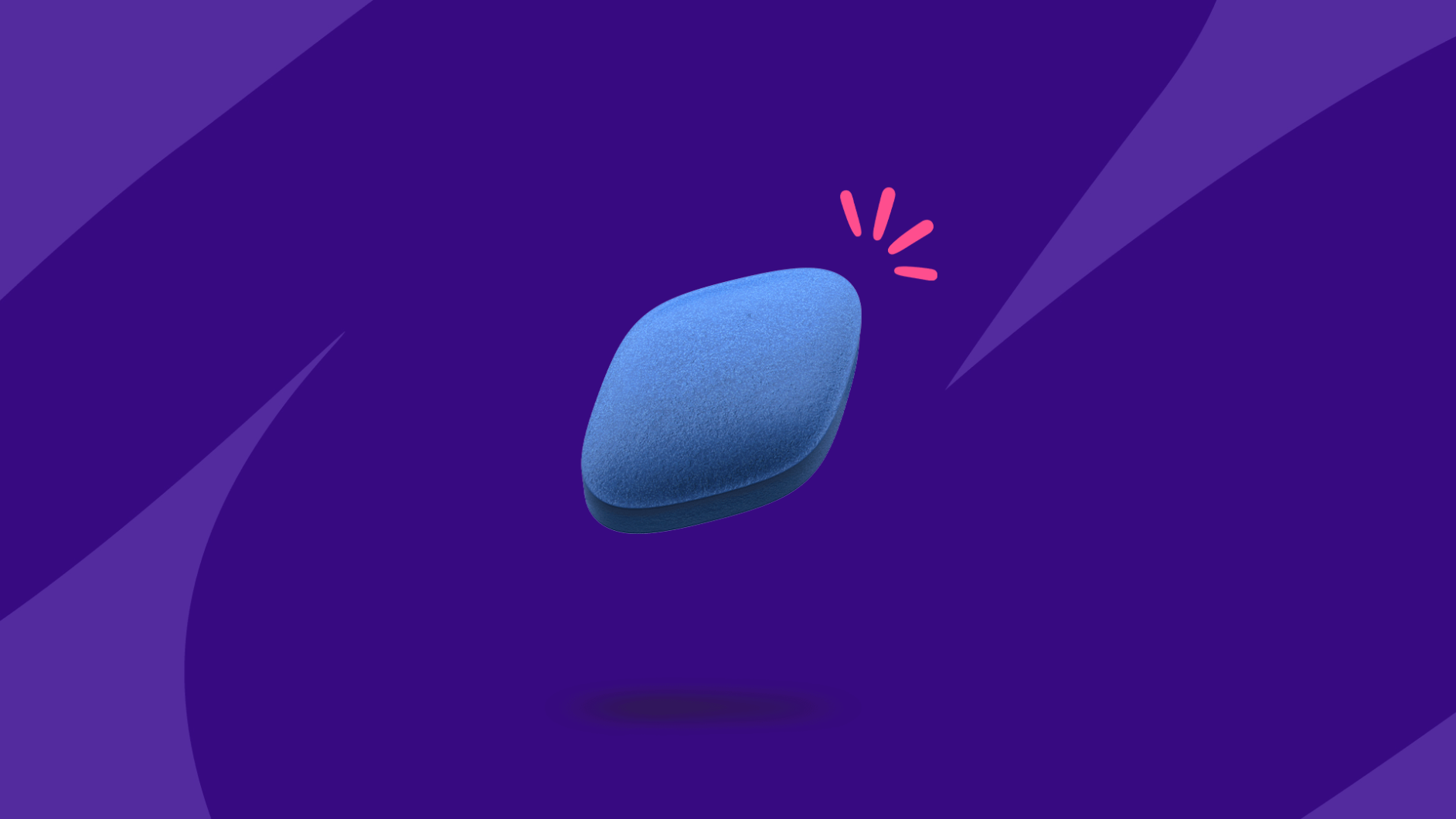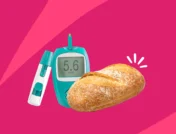How to take Viagra for best results | Dosing | What to expect when taking Viagra | Interactions | How does Viagra treat ED? | FAQs
Viagra (sildenafil citrate) is one of the most well-known erectile dysfunction medications, but there’s a lot more to know about the little blue pill to use it properly, get the full benefits from it, and avoid unwanted side effects. Let’s take a look at how to take Viagra to get the best results.
How to take Viagra for best results
ED pills can be a bit intimidating the first few times you take it. Like any new medication, you probably don’t know what to expect. It’s important to understand how to take Viagra correctly to get the best results. Taking too much Viagra at one time, not taking enough, or taking it under the wrong circumstances could potentially cause side effects, or for the drug to not work at all.
Even though Viagra works well for many men, it isn’t for everyone. You should check with your doctor before taking it. If you have any of the following medical conditions, it’s best to talk with your doctor about whether Viagra is right for you:
- Low blood pressure
- High blood pressure
- Coronary artery disease
- Arrhythmia
- History of heart attack or stroke
If your doctor says it is okay for you to take Viagra and gives you a prescription, there are some things to keep in mind before taking it for the first time.
1. Timing is everything
Many people ask how to take Viagra for the first time. The directions are the same each time you take it. A dose of Viagra should be taken by mouth about one hour prior to sexual activity, but may be taken 30 minutes to four hours before sexual activity. Try to relax, and remember that Viagra does not work without stimulation, so take your time to get in the mood. Also, eating a high-fat meal (such as a burger and fries) before taking Viagra will delay its effect, so the manufacturer recommends you “eat smart before you start.”
These directions are not just for the first time you take Viagra, but they apply every time. After you’ve taken Viagra for the first time and have a better understanding of how it works, it will be easier to use on a more regular basis. Some people may need to take it one hour before sexual activity, whereas others may find that it takes closer to two to three hours to start working for them.
2. Take the prescribed amount
The standard Viagra dose is 50 mg taken with or without food. However, some people will need a higher dose of 100 mg. Others, especially older adults, may only need a 25 mg dose. Some experts recommend taking Viagra on an empty stomach, while the prescribing information notes that Viagra can be taken with or without food. Either way, both agree that you should not take Viagra after a high-fat meal. If you’re taking Viagra regularly, it may be a good idea to keep track of what works best for you.
3. Sexual stimulation is required
Viagra may not work the first time for everyone, so making sure you’re sexually aroused will increase the probability of it working for you. Once it does start to work, you can expect its effects to last up to 3 or 4 hours. An erection should never last more than 4 hours—if it does, seek medical help.
How much Viagra should I take?
Viagra is sometimes referred to as the “little blue pill” because of its blue-colored coating. It’s one of the brand-names of the generic medication called sildenafil citrate, which is manufactured by Pfizer Inc. Viagra pills are labeled with how much sildenafil citrate they contain: 25 mg, 50 mg, or 100 mg. Dosage strengths will vary from person-to-person, so it’s always best to speak with a healthcare professional about how much Viagra is right for you.
The standard dose of Viagra for ED is 50 mg taken as needed, about one hour before sexual activity. According to manufacturer instructions, Viagra should only be taken once per day on an as-needed basis unless otherwise advised by a doctor.
A doctor may adjust someone’s dosage of Viagra based on their age and medical history. For example, men older than 65 or those with hepatic or renal impairment are typically given a starting dose of 25 mg.
The maximum recommended dose of Viagra is 100 mg, and the maximum frequency recommended for taking it—no matter what the dose—is once per day. Taking higher doses of Viagra or taking it more often than prescribed won’t make the medication work better. This can cause side effects that could be life-threatening.
What to expect when taking Viagra
Just like with any medication, taking Viagra comes with the potential for experiencing side effects. Knowing what side effects to look out for can give you some peace of mind in case you end up experiencing any. These are the most common side effects of Viagra:
- Nausea
- Headache
- Flushing
- Stuffy nose
- Nosebleeds
- Blurred vision
- Muscle pain
- Indigestion
- Back pain
- Dizziness
- Rash
How fast does Viagra work?
After taking a dose of Viagra, it is absorbed quickly into the body. Maximum levels are reached within 30 to 120 minutes, with a median time of maximum effectiveness reached in 60 minutes, or one hour.
How long does Viagra last?
The half-life of Viagra is four hours—which means in four hours, half of the drug will be eliminated from the body. A dose of Viagra will completely leave your system within about 20 to 24 hours. You’ll see most of the common, minor side effects go away over that period of time, but the rarer, more severe side effects can be more permanent, says Aaron Emmel, PharmD, the Founder and Program Director of PharmacyTechScholar.com.
How often can you take Viagra?
The prescribing information recommends a maximum of one dose per day. Do not take Viagra more than once every 24 hours.
Serious side effects of Viagra
Viagra’s more serious side effects include allergic reactions, prolonged erections, vision loss, hearing loss, and blood pressure levels that can drop too low.
Allergic reactions: If you’re taking Viagra and start to have difficulty breathing, swelling of the face or throat, or hives, you should seek immediate medical attention as these are signs of an allergic reaction.
Prolonged erections: “One of the most well-known side effects of Viagra is prolonged erections, which can be painful and cause permanent damage if it persists too long,” says Dr. Emmel. “Some underlying conditions make people more susceptible to this, including sickle cell anemia, multiple myeloma, and leukemia.”
If you’re taking Viagra and have an erection that lasts longer than four hours (priapism), you should get emergency medical help as soon as possible. If you’re experiencing prolonged erections regularly, it’s best to talk with your healthcare provider about whether or not continuing to take Viagra is right for you.
Vision or hearing loss: According to Viagra’s official website, taking the medication can sometimes cause sudden vision loss in one or both eyes. This may be a sign of a serious eye problem called non-arteritic anterior ischemic optic neuropathy (NAION). People who are taking Viagra and start to have vision changes should seek medical advice right away to avoid potential eye damage or loss of vision.
In rare cases, Viagra can cause a sudden hearing impairment or loss, which may include ringing in the ears or dizziness. If you have any of these symptoms, stop taking Viagra and consult your healthcare provider right away.
Heart attack and stroke: Rare side effects of Viagra may also include heart attacks and strokes. People with underlying heart problems, like irregular heartbeat, are the most at risk for having a heart attack or stroke from taking Viagra, which is why the medication isn’t recommended for everyone. In fact, Viagra isn’t offered to patients with low cardiac output states or those who are taking measures to prevent heart failure. Even though it may seem like the benefits of taking Viagra are worth the risk because the chance of experiencing a heart attack or stroke is so low, people with any type of underlying heart problems should take extra care in talking with their doctor about their medical history.
Viagra interactions
Viagra shouldn’t be taken simultaneously as some medications because of the potential for drug-drug interactions. “Individuals taking a class of drugs called nitrates should not take Viagra, as this combination can cause dangerous drops in blood pressure. This can cause a problem in individuals with certain types of heart disease or low blood pressure or in those taking certain types of blood pressure-lowering medications,” says Dr. Emmel. Here’s a list of medications that shouldn’t be taken with Viagra:
- Heart medications that contain nitrates such as nitroglycerin or isosorbide mononitrate or isosorbide dinitrate
- Blood pressure and pulmonary arterial hypertension medications like Revatio (sildenafil)
- Vasodilators for chest pain
- Treatments for HIV/AIDS such as ritonavir and saquinavir
- Antifungals including ketoconazole and itraconazole
- Certain antibiotics like erythromycin
- Other ED medications, including Levitra (vardenafil) and Cialis (tadalafil)
There might also be food-drug interactions with Viagra. For example, grapefruit can elevate blood levels of Viagra. TMixing grapefruit or grapefruit juice with Viagra could lead to some side effects like priapism, headaches, flushing, or low blood pressure.
Ask a doctor if there are any other foods or beverages that you should avoid while taking Viagra.
RELATED: Is it safe to combine alcohol with Viagra?
The best way to avoid possible side effects from Viagra is to take it exactly as instructed by your doctor. It’s also important to store Viagra correctly and to not take expired medication. Storing Viagra at room temperature and away from moisture, heat, and sunlight will help make sure the medicine has the most extended shelf-life possible. If you notice that your Viagra is expired, the Food and Drug Administration (FDA) recommends that you wait for a National Prescription Drug Take-Back Day or check with your pharmacy to see if they take back expired medications.
How does Viagra treat erectile dysfunction?
When someone has erectile dysfunction (ED), they cannot get and keep an erection to have sexual intercourse. ED is usually due to a combination of psychological and physical health issues that affect the brain, hormones, muscles, blood vessels, and nerves. Here are some of the most common causes of ED:
- Stress
- Relationship problems
- Anxiety, including performance anxiety
- Depression
- Sleep problems
- Diabetes
- Obesity
- High cholesterol
- High blood pressure
- Hypogonadism (low testosterone levels)
Viagra helps men get and keep an erection by increasing blood flow to the penis. It belongs to a group of medications called phosphodiesterase type 5 (PDE5) inhibitors, which work as vasodilators and cause blood vessels to relax. Viagra can’t permanently cure ED, but it can help in the short-term and is safe to take every day if approved by a doctor. After taking Viagra, most men will be able to maintain an erection for about two to three hours before the effects start to wear off. Viagra is not available over-the-counter and must be prescribed by a physician.
RELATED: How does Viagra work?
Frequently asked questions about Viagra
Can you take Viagra on an empty stomach?
You can take Viagra with or without food. But, taking it with a high-fat meal can make the medication take longer to work.
Can you drink alcohol while taking Viagra?
Avoid alcohol while taking Viagra. The combination of alcohol and Viagra could cause severely low blood pressure.
Does using Viagra cause dependency?
Viagra should not cause dependency, especially if you take it exactly as prescribed.
Can you take Viagra if you don’t have erectile dysfunction?
If you are interested in taking Viagra, the best course of action is to talk to your healthcare provider. Only your healthcare provider can determine if Viagra is appropriate and safe for you to take, and if so, they can send the prescription to a reputable pharmacy. There are many counterfeit Viagra products and scams that you risk if you do not use a licensed pharmacy. Taking Viagra that is not prescribed to you could also potentially lead to dangerous side effects such as severely low blood pressure. Consult your healthcare provider for more information and medical advice.











